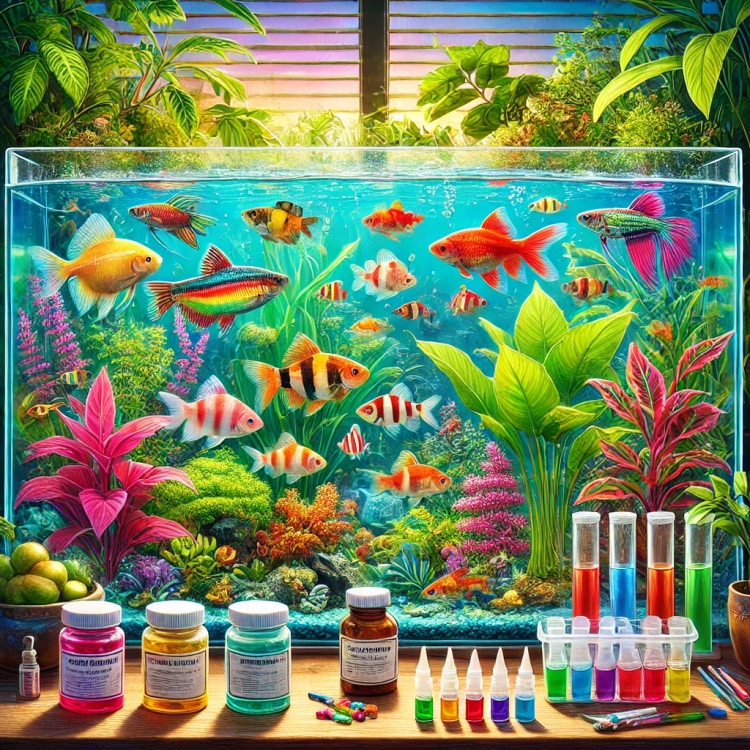Aquarium Fish Medications: Keeping Your Fish Healthy and Happy
Aquarium enthusiasts know the joy of creating a thriving underwater ecosystem. However, ensuring the health and well-being of your fish can be challenging, especially when dealing with diseases. Understanding and using aquarium fish medications effectively can make all the difference in maintaining a vibrant and healthy aquarium. This guide will help you navigate the world of fish health, from identifying issues to using the best fish medications available.

Introduction
Aquarium enthusiasts know the joy of creating a thriving underwater ecosystem. However, ensuring the health and well-being of your fish can be challenging, especially when dealing with diseases. Understanding and using aquarium fish medications effectively can make all the difference in maintaining a vibrant and healthy aquarium. This guide will help you navigate the world of fish health, from identifying issues to using the best fish medications available.
Understanding Common Fish Ailments
Just like any other pet, aquarium fish can suffer from various ailments. Recognizing the signs early can save your fish’s life and prevent the disease from spreading.
- Symptoms to Watch For:
- Unusual swimming patterns
- Loss of appetite
- Discoloration or spots on the body
- Clamped fins or labored breathing
- Common Diseases and Causes:
- Ich (White Spot Disease): Caused by parasites; visible white spots on the fish’s body.
- Fin Rot: A bacterial infection that eats away at the fins.
- Fungal Infections: Cotton-like growths on the skin or gills.
- Dropsy: Swelling of the fish’s body due to fluid retention, often caused by bacterial infections.
Essential Aquarium Fish Medications
When your fish fall ill, having the right medication on hand is crucial. Here are the primary types of medicine for fish:
- Antibiotics for Aquarium Fish:
- Used to treat bacterial infections like fin rot and dropsy.
- Examples: Amoxicillin and erythromycin.
- Antiparasitic Treatments:
- Effective against ich and other parasitic infections.
- Examples: Copper sulfate and malachite green.
- Antifungal Medications:
- Target fungal infections causing cotton-like growths.
- Examples: Methylene blue and potassium permanganate.
- General Remedies:
- Medications like Melafix and Pimafix, which offer broad-spectrum treatment for minor injuries and infections.
When choosing the best fish medications, always read the labels carefully and follow the instructions provided.
How to Choose the Best Medicine for Fish
Selecting the right treatment is vital for your fish’s recovery. Here’s what you should consider:
- Identify the Problem: Examine the symptoms closely and research the likely ailment.
- Consult Experts: Reach out to pet store professionals or aquatic veterinarians for guidance.
- Compatibility with Tank Mates: Ensure the medication won’t harm other fish, plants, or invertebrates in your tank.
- Ease of Use: Opt for treatments that are straightforward to administer and monitor.
By investing in quality medicine for fish, you can give your aquatic pets the best chance at recovery.
Tips for Administering Antibiotics for Aquarium Fish
Antibiotics are powerful tools, but they must be used responsibly to avoid complications.
- Follow Dosage Instructions: Overmedication can harm your fish and disrupt the tank’s ecosystem.
- Quarantine Sick Fish: Treat infected fish in a separate tank to prevent spreading disease and protect healthy tank mates.
- Monitor Progress: Observe the fish daily to ensure the treatment is working. Adjust the plan if necessary.
- Complete the Treatment Cycle: Even if symptoms improve, finish the prescribed course to avoid relapses or resistance.
Preventive Measures for a Healthy Aquarium
Prevention is always better than cure. Keeping your aquarium clean and maintaining optimal conditions can significantly reduce the risk of disease.
- Water Quality: Test water regularly for pH, ammonia, and nitrite levels.
- Diet: Provide a balanced diet to boost your fish’s immunity.
- Quarantine New Additions: Always isolate new fish or plants for at least two weeks before adding them to the main tank.
- Routine Health Checks: Look out for early signs of illness during feeding and cleaning sessions.
FAQs
- What is the best medicine for fish diseases? The best treatment depends on the disease. For bacterial infections, antibiotics like erythromycin are effective. Antiparasitics are great for ich, while antifungal medications tackle fungal infections.
- Can I use antibiotics for aquarium fish without a prescription? While some antibiotics are available over the counter, it’s always better to consult an expert to avoid misuse.
- How can I prevent diseases in my aquarium? Maintain water quality, provide a balanced diet, quarantine new additions, and observe fish regularly for early signs of illness.
- Is it safe to medicate the entire tank? Medications can affect the tank’s ecosystem. Quarantining sick fish is generally a better approach to targeted treatment.
- How long should I quarantine new fish? Quarantine new fish for 14-21 days to ensure they are healthy before introducing them to the main tank.
Conclusion: Your Partner in Pet Supplies
Ensuring the health and happiness of your aquarium fish requires knowledge, care, and the right supplies. By understanding common fish ailments, using effective treatments, and practicing preventive care, you can maintain a thriving aquatic environment.
What's Your Reaction?

















